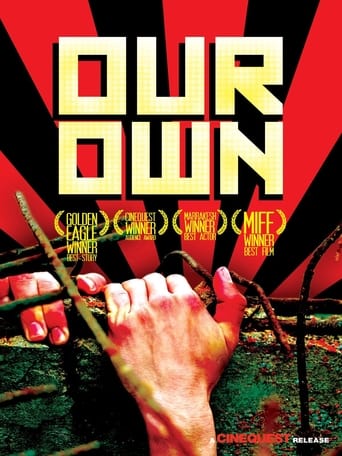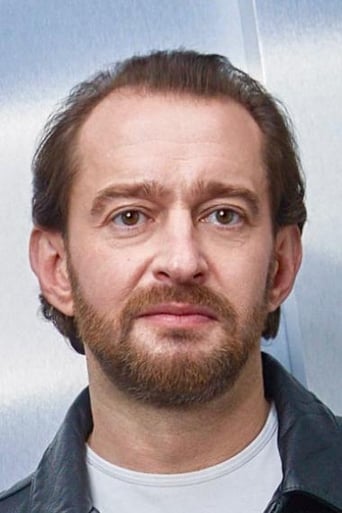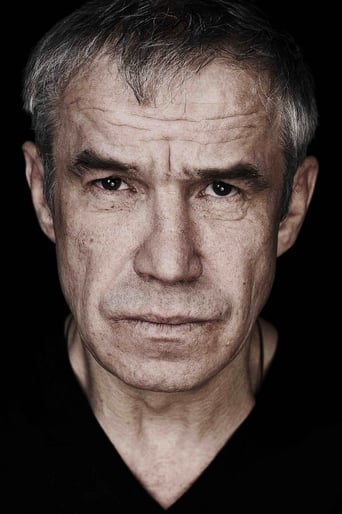

Our Own (2004)
It is August 1941. With the battle line far away in the east, three soldiers who have managed to escape from captivity find it difficult to hide: the territory is occupied by the enemy. The local woods are not safe: you can easily get embogged. Are the villagers loyal? Nobody can say. There is an old man who offers to help them. Is he reliable enough? He may kill them or report them to the local German authorities. Anything may happen, but one of them, the sniper, is his son who is his youngest, his dearest.
Watch Trailer
Cast


Reviews
Best movie ever!
Let me be very fair here, this is not the best movie in my opinion. But, this movie is fun, it has purpose and is very enjoyable to watch.
Exactly the movie you think it is, but not the movie you want it to be.
A terrific literary drama and character piece that shows how the process of creating art can be seen differently by those doing it and those looking at it from the outside.
a Russian war film. or, only, a Russian film. impressive script, admirable acting. and profound role of landscapes images. a movie like a rope. nuances of duty and love, communism and life under occupation, about chance, fear, cruelty and sacrifice, about profound image of reality in a village and splendid eulogy to basic values. so, a film about wars. each detail, each side of violence, the construction of dialogs and the waters of faces are important because , more than a story it is a picture about sense of small gestures,moral force in dark times. as many others movies of genre from Russia, using a noble tradition, it is a Christian movie and, in same measure, reconquest of past events in a new and clear light.
War is about a lot of things; mostly, though, it's about daily survival for those involved. That, essentially, is what this story is about and hence no different to other war stories.Being set somewhere in the Soviet Union of 1941, though, makes it different for non-Russians: the landscape is new, seemingly limitless, gray skies, barely inhabited, bleak in parts, lush forests in others, almost like another planet; and all filmed with de-saturated color that just makes it look all the more forbidding. Hence, against such a savage and unforgiving landscape, the trifles of the hapless and disparate trio of soldiers who arrive unannounced at a remote village seem hardly worth bothering about.The youngest of the three, however, knows more than the other two because this is his village, the place where he grew up and where his father is a local official who manages to tread the fine line between accommodating the demands of German occupation forces while also trying to help the three – particularly his son – to evade recapture. Needless to say, that's a dangerous game the old man plays and especially when he must also deal with the local police who are looking for the escaped soldiers.Add to that mix, there is the young local woman whom the son wishes to wed; and, to add to the old man's worries, the tough leader of the threesome falls in love with the old man's much younger wife. Such gratitude, indeed! The third soldier is physically sick much of the time, and is cared for by the old man and his woman; so, the sick one spends much of his time, coughing, moaning and lying in bed – and yet, he plays the most crucial role in the whole story towards the end.From one perspective, soldiers always want and need to survive; yet, from another, there is the basic human need to connect to another. It's that aspect which is explored and developed by the writer and director within a setting that is barely conducive to fighting, let alone staying alive. It's a tour de force in acting from actors I've not seen before.Productions standards are high: from the opening, gritty and horrific battle scenes to the pictures of typical domestic rural life – if not tranquility – within the Russian ark. Having been hugely entertained by Kukushka (2002) and The Return (2003), there is no doubt that only Russians are needed to make excellent Russian movies. This one is equally worth seeing.Not for children, of course, and highly recommended.
Dmitri Meskhiev's "Svoi" (which means "one's own") focuses on the moral dilemma of some Soviet soldiers during WWII. After they escape a POW camp, they end up on a farm. But this farm, while Russian, turns out to be not much different from anything operated by the Nazis. The character Nikolai, due to his manipulative actions, has more control over things than the Nazis do. To Starosta, the Chekist represents the 1930s repression in the USSR. As for why Starosta doesn't kill the man at the end...it's because the man is still one of his OWN (not a German).I certainly recommend this movie. Full comprehension of the plot does require some understanding of Soviet policy during WWII, namely that Stalin vowed to punish the family of any soldier who surrendered to the German army. But anyway, it's a really good movie.
This is a WWII movie that deals more with the dilemma many people dealt with who lived in areas like Finland, the Baltics, Poland, the Ukraine, etc. Basically, they found themselves sandwiched between two totalitarian regimes. While some obviously saw the Nazis for what they were, to others, the Nazis where seen as liberators from Stalin's repressions. For instance, if your whole family had either been sent off to the gulags or starved to death due to Stalin's collectivization of agriculture, anybody who would free you from the people who perpetrated that sort of evil had to seem like saviors.Best I could tell, the movie takes place either in present day Finland or the Karelia region of Russia. One of the characters in the movie is referred to as a Chekist. To those who may not be polished on their early soviet history, the Cheka was the predecessor of the NKVD. Actually by the 40's, the Cheka had already been incorporated into the NKVD. Anyway, this is an important fact to know to understand the relationship between two of the characters in the movie and why they distrust each other.If you have seen the Finnish film Kukushka and liked it, you will likely also enjoy this film.




